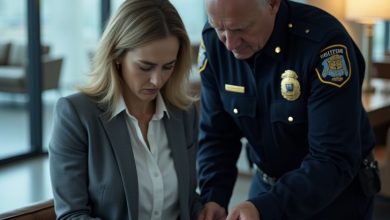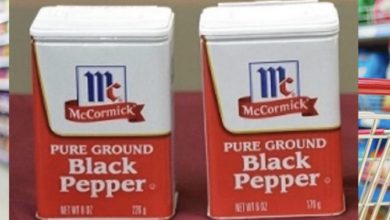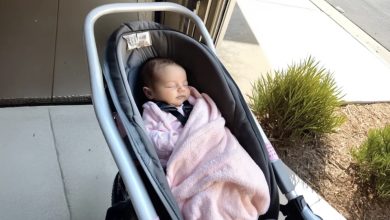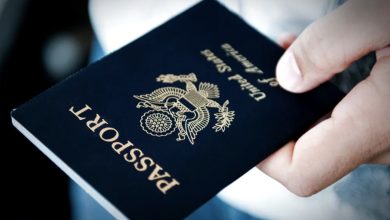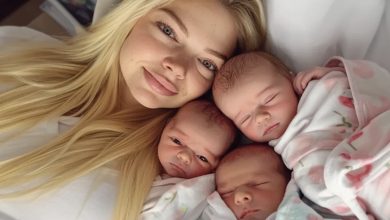“Her Husband Laughed When She Signed Away All Their Property—Then the Judge Discovered the Truth Behind Her Plan”
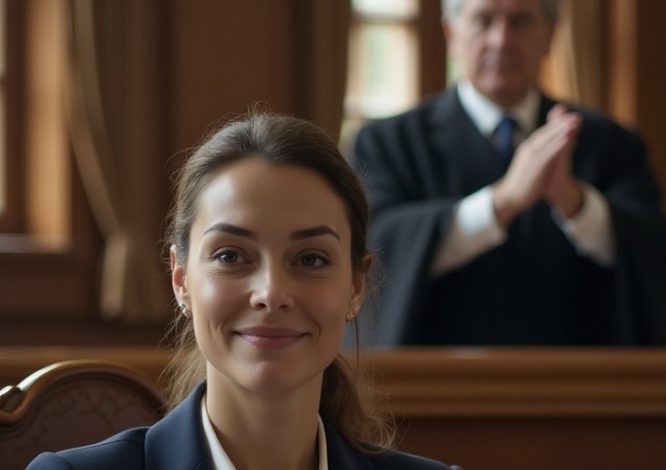
During the divorce, Natasha calmly gave up all her property to her husband — while he laughed right in her face. But when the judge discovered why she had done it, he stood up and applauded. No one in that courtroom could believe how cleverly Natasha turned everything around.
When thirty-six-year-old accountant Natasha Reed quietly signed away her entire fortune to her husband, Ian, most people in the courtroom were sure she had lost her mind. Her husband’s lawyer was already smiling, ready to celebrate an easy victory. But half an hour later, when everyone finally understood her plan, the gray-haired judge stood up from his chair and began to clap — something he had never done once in his thirty years on the bench. It was the day a calm, modest woman taught everyone in that courtroom what real intelligence looked like.
Natasha sat at the front table with perfect posture, a pen balanced in her hand. She wore a gray suit, her dark hair tied neatly in a bun. Her face was calm — far too calm for a woman who was about to lose everything she had worked for over ten years of marriage. Beside her, her nervous young lawyer kept glancing at her as if waiting for her to change her mind.
Across the room, Ian Reed leaned back in his chair, grinning smugly. At forty, he looked every bit the man who thought he had just outsmarted everyone in the room. He had a tan, an expensive watch, and the kind of self-satisfied smirk that made people uncomfortable. His lawyer whispered something in his ear, and Ian chuckled loudly.
“What a fool I married,” Ian muttered, not even bothering to keep his voice down. “She’s just giving it all away. I told you she’d never last without me.”
The judge — Michael Sokolov, a man with gray hair and calm, serious eyes — frowned slightly as he read the documents before him. He had seen many strange cases in his career, but this one was different. A wife willingly giving her husband everything? That was rare, and suspicious.
“Mrs. Reed,” the judge said slowly, taking off his glasses, “do you fully understand what you’re doing? The apartment downtown, the car, the savings accounts, even your parents’ townhouse — you’re transferring all of it to your husband? Without any payment or condition?”
Natasha nodded gently. “Yes, Your Honor. I understand perfectly.”
Ian laughed, shaking his head in disbelief. “See, Your Honor? She’s finally come to her senses.”
Natasha opened her folder and added, almost casually, “I’d also like to include the lake house in Michigan. It’s only fair.”
That made Ian sit up straight. He had completely forgotten about the old lake house, but now that she mentioned it, it was worth at least two hundred thousand dollars. His lawyer smiled, already calculating his bonus.
The people in the courtroom started whispering. The judge’s expression darkened. Something wasn’t right. No one gave up this much without a reason.
“Mrs. Reed,” the judge said again, “if you are under pressure, or someone is threatening you, you can tell the court. We can protect you.”
Natasha shook her head and reached into her handbag. She took out a thick medical folder and placed it gently on the table. Her voice stayed calm. “No one is forcing me, Your Honor. Two months ago, I was diagnosed with stage four cancer. The doctors gave me six months at most.”
The room went completely still. Ian stopped smiling. His lawyer looked down, pretending to read something, but his hands were shaking.
Natasha went on, her tone soft but steady. “I don’t want to spend what time I have left fighting in court. Let Ian have everything. I won’t need it anymore.”
Ian’s lips twitched, torn between shock and relief. If what she said was true, he would soon be rich — and free.
But then Natasha added quietly, “There’s one more thing, Your Honor. Three days ago, I transferred all of my assets to a charity foundation for orphaned children. The transfer becomes official in two days — unless my husband decides to withdraw his divorce petition right now.”
The silence broke. Ian jumped to his feet, his face red. “What?! What foundation? Are you insane?”
Natasha looked at him with the same calm smile. “It’s your choice, Ian. Withdraw the divorce, stay married, and the assets remain in the family. But you’ll have to take care of a dying wife. Or continue with the divorce and watch it all go to charity.”
The color drained from Ian’s face. His lawyer leaned close, whispering frantically, but Ian was too stunned to listen. He slammed his hand on the table. “I need a break! I have to talk to my lawyer!”
But Natasha wasn’t finished. She took another folder from her bag and placed it on the table. “Before you decide, Ian, there’s something else. About our son, Max.”
Ian froze.
Natasha opened the folder to reveal adoption papers. “Five years ago, you officially adopted Max to help us qualify for the condo. You are his legal father now — with all the responsibilities that come with it.”
The judge leaned forward. Ian’s lawyer scanned the papers. They were perfectly valid, sealed and signed.
“Mr. Reed,” the lawyer whispered, pale, “by law, you are fully responsible for this child — his care, his schooling, his medical bills — until he turns eighteen. You can’t simply walk away.”
Natasha’s eyes glimmered with something sharper than sadness. “Ian, I have to tell you the truth. I’m not the one who’s sick. Max is.”
Ian stared at her, speechless.
Natasha laid down medical papers and photographs — test results, doctor notes, scans. “Our son has a rare form of leukemia. Without urgent treatment in Munich, he has only a few months left. The cost of therapy is three hundred thousand euros.”
The entire courtroom went silent again. Ian’s mouth opened, but no words came out.
“You’re lying!” he shouted finally. “This is a trick!”
Natasha didn’t respond. Instead, she pulled out a tablet and played a video showing three doctors seated in a consultation room. The first doctor, an older man with a gray beard, spoke clearly: “Patient: Max Reed, age eight. Acute lymphoblastic leukemia, stage four. Immediate experimental treatment is required abroad. Without it, the prognosis is poor — two to three months at most.”
Everyone in the courtroom watched in stunned silence.
The doors opened, and two people entered — a tall man in a formal suit and a young woman carrying documents. “Dr. Steinberg from the Munich Pediatric Oncology Clinic,” the man said with a German accent. “We’ve reviewed the boy’s case and can begin treatment within a week. Time is critical.”
The translator added, “The initial deposit is fifty thousand euros. It must be paid within three days.”
Ian sat down heavily, his face gray. He looked from the judge to his lawyer, who had no idea what to say.
Natasha took out two plane tickets. “Our flight to Munich is booked for the day after tomorrow. Max is stable for now, but we can’t delay much longer.”
Ian shook his head violently. “I can’t pay that! I don’t have that kind of money!”
Dr. Steinberg turned to the judge. “Under both American and German law, payment for a minor’s treatment is the responsibility of the legal guardian — Mr. Ian Reed.”
Natasha nodded. “Your Honor, my husband will be receiving assets worth over 1.5 million dollars. That should be enough to cover his son’s treatment.”
Ian looked like he was about to faint. He finally realized the trap: accept the assets, and he’d be legally forced to pay for Max’s care; refuse them, and he’d have nothing — but still be responsible for the child.
“I refuse guardianship!” he shouted. “Let the state handle it!”
The judge raised his hand. “Mr. Reed, refusal is not an option. If you take the property and abandon the child, it’s considered child endangerment and fraud. You could face up to seven years in prison.”
Ian’s lawyer tried one last desperate move. “Your Honor, if we can prove Mrs. Reed hid the child’s illness, we can cancel the property transfer.”
Natasha calmly handed her phone to the clerk. “Here are all our messages from the past year. I told Ian several times that Max was sick and needed tests. He replied, ‘Stop exaggerating, he’s just a kid.’”
The judge’s expression hardened. Ian buried his face in his hands.
A moment later, the courtroom doors opened again, and an older woman entered — Ian’s mother, Valentina. She was dressed in fur and diamonds, her expression sharp until she saw the photo Natasha handed her: little Max in a hospital bed, smiling weakly.
“This is your grandson,” Natasha said quietly. “He’s dying. And the only one who can save him is your son.”
Valentina’s face crumbled. She began to cry, falling to her knees in front of the judge. “What have we done?”
The room was filled with heavy silence. Ian stared at his mother, then at the papers in front of him. The judge finally spoke. “Mr. Reed, the law is clear. You may choose to accept or refuse the assets, but in both cases, you remain legally bound to support your child.”
Ian’s shoulders sagged. There was no way out. Slowly, with shaking hands, he signed the documents.
When the judge struck his gavel, Ian sat motionless. His lawyer quietly packed up his things and said, “I can’t represent this man any longer.” Then he walked out.
The judge stood, his eyes on Natasha. “In thirty years, I have never seen such courage or intelligence in this courtroom,” he said. Then he began to clap. The clerk joined him, then the others — soon the whole room was applauding.
Natasha didn’t smile. She only looked at Ian and said softly, “Max still believes he has a father. Don’t disappoint him again.” Then she left the courtroom.
Three years later, O’Hare International Airport. Ian Reed waited near the arrivals gate, holding a folder of documents. He had aged terribly; his hair was gray, his face thin. He had sold everything to pay for Max’s treatment. But the boy had survived.
From the gate, Natasha appeared, holding Max’s hand. The child was taller now, healthy, with bright eyes. When he saw Ian, he ran toward him. “Daddy Ian! You came!” he shouted, hugging his legs.
Ian froze, his throat tight.
Natasha walked up slowly. “Thank you for not giving up on him,” she said quietly. “I know these years weren’t easy.”
Ian handed her the folder — official papers ending his guardianship. “It’s over,” he said softly. “I’m free.”
But the word free didn’t feel like freedom.
Max tugged on his sleeve. “Daddy Ian, can you come live with us now? Mom said we can be a family again.”
Ian looked into the boy’s hopeful eyes, and for the first time, truly felt what it meant to love. But it was too late. Natasha nodded gently, took Max’s hand, and led him away.
Ian stood there, alone, watching them leave — a man who had gained everything and lost the only thing that ever truly mattered.


